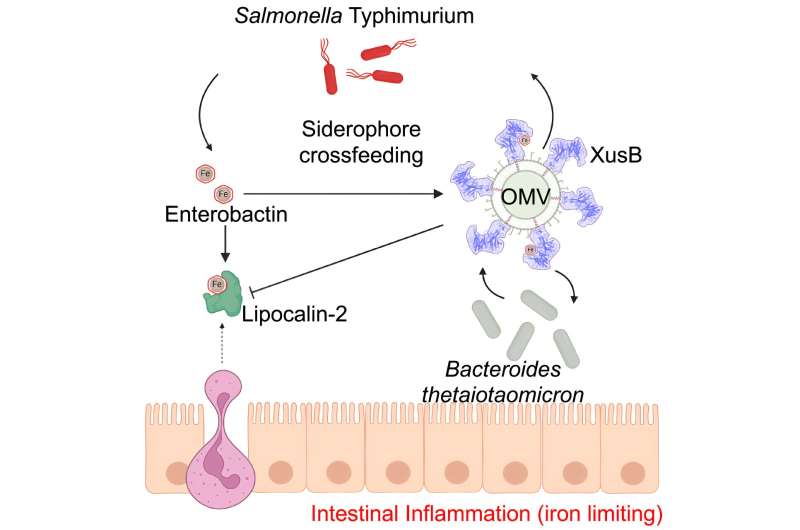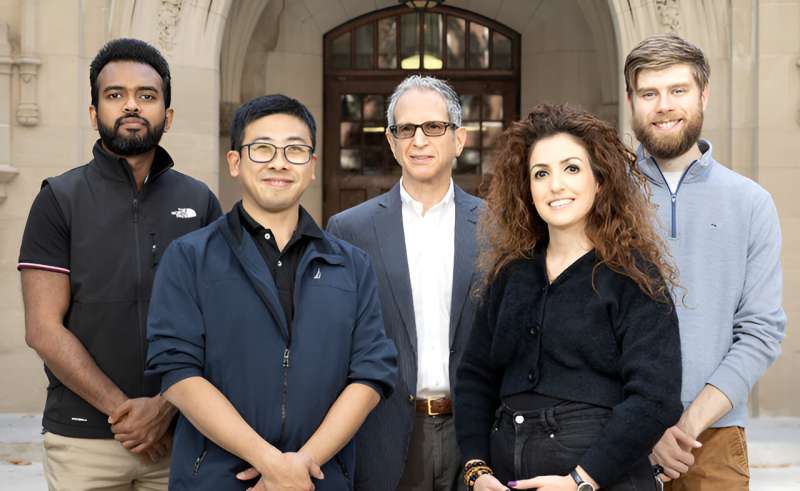This article has been reviewed according to Science X's editorial process and policies. Editors have highlighted the following attributes while ensuring the content's credibility:
fact-checked
peer-reviewed publication
trusted source
proofread
Study discovers role for gut bacteria in host-pathogen competition for nutrients

When pathogens like Salmonella invade the gut, a struggle for essential nutrients such as iron begins. Salmonella—and other bacteria—produce compounds to capture iron, and the host counters with its own proteins to sequester those compounds and starve the pathogen, a response called nutritional immunity.
Now, a new study published in the journal Cell Host & Microbe brings the beneficial bacterial residents of the gut into the mix. The findings show that commensal gut microbes impact the host-pathogen competition for iron and have implications for therapeutic strategies aimed at preventing pathogens from acquiring essential nutrients.
"Historically, studies of the competition for iron and other nutrients have focused largely on pathogens and host," said Wenhan Zhu, Ph.D., assistant professor of Pathology, Microbiology and Immunology and the lead corresponding author of the paper. "But this interaction doesn't happen in a vacuum; it happens in the context of trillions of other bacteria that live in the gut. Our work has added this layer to the story of nutritional immunity."
Gut microbes play an important role in human health; they aid in digestion, maintain the structural integrity of the gut mucosal barrier, modulate immune responses and protect against pathogens. And like our own cells and pathogens, they require iron and other essential nutrients to survive.
"We've been interested in what happens to the 'good guys' when Salmonella infects us, causing inflammation and iron limitation," Zhu said. "How do they survive when times are hard?"
The researchers, led by senior scientist Luisella Spiga, Ph.D., and graduate student Ryan Fansler, discovered that the commensal bacterium Bacteroides thetaiotaomicron secretes a protein called XusB that can bind the iron-binding compounds produced by the pathogen to acquire the iron it needs to survive.
In a twist that surprised the researchers, this binding by XusB shields the iron-binding compound from the host proteins but allows the Salmonella bacteria to "reacquire" the complex and the essential iron.
"The good guys steal from the bad guys, but ironically, the bad guys steal back, and this allows the bad guys to evade nutritional immunity," Zhu said. "In trying to survive, the good guys are helping the bad guys. That was a surprise."

Postdoctoral fellow Yasiru (Randy) Perera, Ph.D., and Walter Chazin, Ph.D., Chancellor's Professor of Medicine and professor of Biochemistry and Chemistry, completed structural biology and biophysical studies to probe the mechanistic underpinnings of this back-and-forth between XusB and the Salmonella iron-binding compound.
The researchers also found that multiple Bacteroidetes species—"cousins" of the commensal bacterium they studied—encode structural homologs of XusB that would be expected to interact in similar ways with pathogen iron-binding compounds.
"Structural details of this interaction are foundational for mechanistic insights, which are key to a new therapeutic strategy we're working on: engineering the commensal proteins so that they bind to the iron-binding compound in such a way that the pathogen can't steal it back," Zhu said.
Zhu and his team aim to generate probiotic bacteria that produce an altered XusB protein that would "soak up" all the iron-binding compound produced by the pathogen, but that the pathogen could not reacquire, starving it of needed iron.
More information: Luisella Spiga et al, Iron acquisition by a commensal bacterium modifies host nutritional immunity during Salmonella infection, Cell Host & Microbe (2023). DOI: 10.1016/j.chom.2023.08.018
Journal information: Cell Host & Microbe
Provided by Vanderbilt University




















